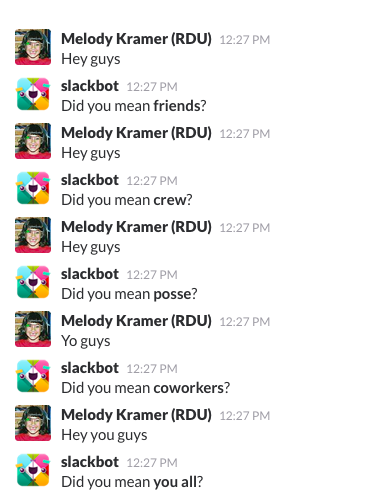How do you nudge people to make better decisions with their language?
It’s a difficult question: you don’t want to make someone feel bad, but it’s important to have everyone think about diverse and inclusive language.
Not too long ago, we noticed people saying the word “guys” to describe groups of people in our internal Slack chat rooms. Not a terrible error, but we want to build a diverse and inclusive workplace where people use more inclusive language. So we customized Slackbot’s autoresponses to respond automatically with different phrases if someone uses the words “guys” or “guyz”. (Instructions here.) The bot says things like:
Did you mean team?
Did you mean all?
Did you mean pals?
Did you mean gang?
Did you mean crew?
Did you mean people?
Did you mean y’all?
Here’s what it looks like in action:

Turns out, a little cultural hack can go a long way. It’s easy to forget these things and say guys unconsciously, but a nice, friendly, automated reminder solves that issue, and reduces the need for any kind of person-to-person conversation.
Our workplace strives to cultivate an inclusive culture by valuing, respecting, and supporting the needs of every individual. It’s important to listen to voices from a range of backgrounds, races, locations, gender identities, income levels, ages, and levels of experience. This ensures that every person feels comfortable to be themselves at work, and it improves the quality of work our team produces.
Even though many people see “guys” as a harmless, genderless word, not everybody does. You can think of the opposite word to guys (for example: gals or girls) and wonder if a group of men would feel comfortable being referred to as girls. When someone refers to you using a word that you don’t identify with, it’s easy to feel excluded from conversation or misidentified.
This little bot is a small way we can bake in our values, culture, and practices into a communication tool we use every day.
Inspiration for this came from Jina Anne and Scott Cranfill.

